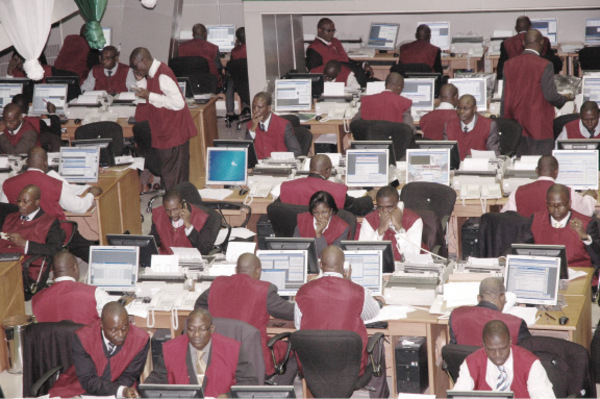 Positive outing in November by the Nigerian equities, rallying about N314.34 billion in capital gains reduced investors losses to N1.65 trillion, reports the Nation newspaper
Positive outing in November by the Nigerian equities, rallying about N314.34 billion in capital gains reduced investors losses to N1.65 trillion, reports the Nation newspaper
Average return at the stock market stood at 2.45 per cent at the weekend, equivalent to net capital gains of N314.34 billion in November.
The November rally, the fourth monthly positive performance this year, reduced the 11-month average loss by investors in quoted equities to N1.65 trillion. Average year-to-date return closed at the weekend at -14.09 per cent.
The All Share Index (ASI)- the benchmark index that tracks share prices at the Nigerian Stock Exchange (NSE), closed weekend at 27,002.15 points as against its opening index of 26,355.35 points for November. Aggregate market value of all quoted equities also increased from November’s opening value of N12.830 trillion to close the month at N13.033 trillion. The difference between the ASI and market value of quoted equities was due to the delisting of Dangote Flour Mills (DFM) during the month.
The ASI had opened 2019 at 31,430.50 points, 17.81 per cent down from its 2018’s opening index of 38,243.19 points. Aggregate market value had opened 2019 at N11.721 trillion. The seeming appreciation in the year-to-date performance of aggregate market value of all quoted equities was due to the unabsorbed boost from the listing of two leading telecommunication companies- MTN Nigeria Communications Plc and Airtel Africa Plc.
Based on market values, both the ASI and market capitalisation are correlated indices and without new listing or delisting, usually move simultaneously in the same direction. But the ASI is weighted, and as such adjusted for effect of new listing while the market capitalisation is a straight-line summation of share prices and issued shares. Thus, where the ASI and market capitalisation differ, the ASI is widely regarded as the true representation of the market condition.
Market analysts attributed the November rally to the recent restriction of Nigerian companies and individuals from the Open Market Operation (OMO) market by the Central Bank of Nigeria (CBN). With the resultant decline in fixed-income yields, and depressed valuation of quoted equities, investors appeared to adjust portfolio more in favour of quoted shares.
Most analysts however remained conservative about the short-term outlook for the equities market citing sluggish macroeconomic outlook.
“However, the gradual recovery in the economy is slow paced and may not support an overtly bullish expectation in the short-term. Yet, we believe the market has been far compressed and remains attractive for equity investors,” Afrinvest Securities stated.
Analysts at Cordros Securities said the market might open to profit-taking in December as investors seek to lock in capital gains from recent weeks.
“Consequently, we expect the market to shed points in the coming week, absent a policy-driven catalyst. Nonetheless, the case for the market to record some gains over the short to medium term remains compelling, even as the valuation picture becomes less compelling,” Cordros Securities stated.
Further analysis showed that the recovery in November was driven by significant capital gains in the highly influential banking sector, with the NSE Banking Index rising by 15.26 per cent. The NSE Consumer Goods Index, which tracks consumer goods sector, rose by 4.87 per cent. Its counterpart, the NSE Industrial Goods Index, which tracks industrial goods sector, followed with average gain of 4.53 per cent. The NSE Oil and Gas Index posted a modest gain of 0.49 per cent while the NSE Insurance Index closed flat.
On 11-month basis, nearly all investors remained in the red. The NSE Banking Index showed average return of -9.48 per cent for the 11-month period. The NSE Consumer Goods Index showed the worst performance with -27.66 per cent. The NSE Oil and Gas Index followed with average loss of 22.25 per cent. The NSE Industrial Goods Index declined by 12.53 per cent while the NSE Insurance Index dropped by 4.97 per cent.
Most analysts agreed that the stock market performance had been weakened by macroeconomic uncertainties, political risks, insecurity and cash crunch at the domestic level. With foreign portfolio investors accounting for nearly half of transactions at the Nigerian stock market, the tense global economic outlook, trade disagreements among major economies, decline in crude oil price and attractive yields in less-risky economies compounded the Nigerian market situation.













